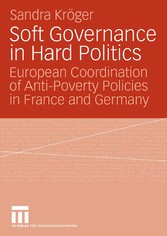Search and Find
Service
More of the content

Soft Governance in Hard Politics - European Coordination of Anti-Poverty Policies in France and Germany
"3 Research framework (S. 51-52)
There are four shortcomings in the existing OMC literature which will be addressed first in this chapter. Afterwards, the research design of this study will be laid out. The first shortcoming relates to the evaluation criteria of the OMC. Studies have by and large concentrated on either the effectiveness or the legitimacy of the OMC. Whereas legitimacy presupposes the trust and solidarity which are necessary to accept general rules without a general feeling of being exploited, effectiveness assures that policies contribute to collective problem-solving (Offe 1998, Scharpf 1999). I suggest that it is necessary to address both in order to come to a thorough conclusion concerning the potential and possible effects of the OMC.
First, this is so as both are official expectations articulated in the Lisbon strategy, namely contributing to an effective social policy by way of learning and contributing to a legitimate social policy via participation. The Portuguese presidency underlined that the aim of the OMC is ""to organise a learning process at European level in order to stimulate exchange and the emulation of best practices and in order to help Member States improve their own national policies"" (European Council 2000a: 6).
Member states are thus encouraged to learn from past policy successes of other member states and to use this information when dealing with domestic policy challenges. The OMC seeks to institutionalise regular consultations among concerned actors at various governance levels and thereby extends learning towards wider social learning by pooling information about experiments in a bottom-up process. Therefore, effectiveness should be evaluated in terms of learning. The OMC template also seeks to increase the legitimacy of European policy-making and it does so by putting a particular focus on the broad participation of actors:
""The development of this method in its different stages should be open to the participation of the various actors of civil society"" (Council of the European Union 2000b: 6) and ""action depends to a large extent on the initiative of the actors in civil society, the social partners, enterprises, associations, regions and the citizens in a European civil society, which we must continue to build"" (Council of the European Union 2000a: 22).
The active participation of a variety of actors at the different governance levels was thus judged crucial as a means to increase the legitimacy of the instrument and the EU more generally. Depending on the perspective and the perceived role of the EU, some do not perceive a democratic deficit (Majone 1998, Moravcsik 1993, 2002, Scharpf 2007). Others characterise the EU as a system sui generis, to which other or at least additional mechanisms of legitimacy-building should apply (Eriksen 2001, Kohler-Koch and Rittberger 2007).
Others again think that the EU is in need of more institutionalised safeguards of democratic legitimacy (Eriksen 2001, Kohler- Koch and Finke 2007, Smismans 2004). It may be questioned why, if nonbinding, legitimacy is an issue at all with regard to the OMC. However, there are a number of reasons why the legitimacy of the OMC should be assessed. The first has just been laid out above: because increasing the legitimacy of the EU is one of its main goals. Second, the OMC inclusion is a political process in which norms and values are chosen and interpreted which are directly linked to the living conditions of citizens. "
All prices incl. VAT












